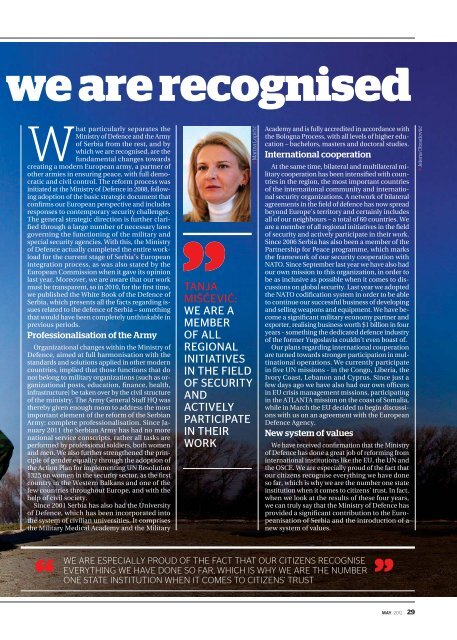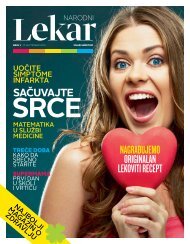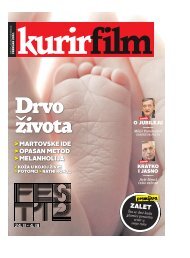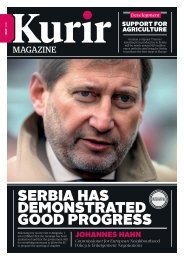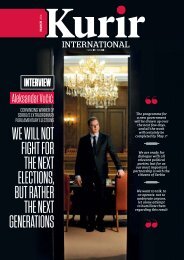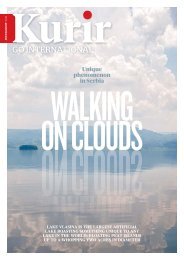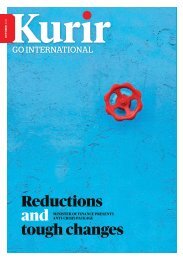Kurir Go International magazine 006
Kurir Go International is the most respected thematic magazine in English published in Serbia and at the same time the only dominantly one dealing with European integrations. This makes it exclusive not only in Serbia but gives Kurir the advantage of being the only magazine using this way of communication with the EU institutions although originating from a non-EU member country. KM is a synonym for an exchange of opinions on political and economic issues concerning Serbia’s road towards the EU. Magazine Kurir Go International was distributed to all the MP clubs in the European PARLIAMENT, as well as the highest officials of the European Commission. In Serbia, Kurir Go International was aimed at directors of leading multinational companies, representatives of foreign COMPANIES, diplomats, ambassadors, consuls, members of business associations, GOVERNMENT agencies. Kurir is also envisioned for the international organizations working in Serbia, including OSCE Mission to Serbia, Office of the European Commission in Belgrade, EU info point and FRIDRICH EBERT Foundation.
Kurir Go International is the most respected thematic magazine in English published in Serbia and at the same time the only dominantly one dealing with European integrations. This makes it exclusive not only in Serbia but gives Kurir the advantage of being the only magazine using this way of communication with the EU institutions although originating from a non-EU member country. KM is a synonym for an exchange of opinions on political and economic issues concerning Serbia’s road towards the EU.
Magazine Kurir Go International was distributed to all the MP clubs in the European PARLIAMENT, as well as the highest officials of the European Commission. In Serbia, Kurir Go International was aimed at directors of leading multinational companies, representatives of foreign COMPANIES, diplomats, ambassadors, consuls, members of business associations, GOVERNMENT agencies. Kurir is also envisioned for the international organizations working in Serbia, including OSCE Mission to Serbia, Office of the European Commission in Belgrade, EU info point and FRIDRICH EBERT Foundation.
You also want an ePaper? Increase the reach of your titles
YUMPU automatically turns print PDFs into web optimized ePapers that Google loves.
we are recognised<br />
What particularly separates the<br />
Ministry of Defence and the Army<br />
of Serbia from the rest, and by<br />
which we are recognised, are the<br />
fundamental changes towards<br />
creating a modern European army, a partner of<br />
other armies in ensuring peace, with full democratic<br />
and civil control. The reform process was<br />
initiated at the Ministry of Defence in 2008, following<br />
adoption of the basic strategic document that<br />
<br />
responses to contemporary security challenges.<br />
The general strategic direction is further clari-<br />
<br />
governing the functioning of the military and<br />
special security agencies. With this, the Ministry<br />
of Defence actually completed the entire workload<br />
for the current stage of Serbia’s European<br />
integration process, as was also stated by the<br />
European Commission when it gave its opinion<br />
last year. Moreover, we are aware that our work<br />
<br />
we published the White Book of the Defence of<br />
Serbia, which presents all the facts regarding issues<br />
related to the defence of Serbia – something<br />
that would have been completely unthinkable in<br />
previous periods.<br />
Professionalisation of the Army<br />
Organizational changes within the Ministry of<br />
Defence, aimed at full harmonisation with the<br />
standards and solutions applied in other modern<br />
countries, implied that those functions that do<br />
not belong to military organizations (such as or-<br />
<br />
infrastructure) be taken over by the civil structure<br />
of the ministry. The Army General Staff HQ was<br />
thereby given enough room to address the most<br />
important element of the reform of the Serbian<br />
Army: complete professionalisation. Since January<br />
2011 the Serbian Army has had no more<br />
national service conscripts, rather all tasks are<br />
performed by professional soldiers, both women<br />
and men. We also further strengthened the principle<br />
of gender equality through the adoption of<br />
the Action Plan for implementing UN Resolution<br />
<br />
country in the Western Balkans and one of the<br />
few countries throughout Europe, and with the<br />
help of civil society.<br />
Since 2001 Serbia has also had the University<br />
of Defence, which has been incorporated into<br />
the system of civilian universities. It comprises<br />
the Military Medical Academy and the Military<br />
> Marina Lopičić<br />
TANJA<br />
MIŠČEVIĆ:<br />
WE ARE A<br />
MEMBER<br />
OF ALL<br />
REGIONAL<br />
INITIATIVES<br />
IN THE FIELD<br />
OF SECURITY<br />
AND<br />
ACTIVELY<br />
PARTICIPATE<br />
IN THEIR<br />
WORK<br />
Academy and is fully accredited in accordance with<br />
the Bologna Process, with all levels of higher education<br />
– bachelors, masters and doctoral studies.<br />
<strong>International</strong> cooperation<br />
At the same time, bilateral and multilateral mi-<br />
tries<br />
in the region, the most important countries<br />
of the international community and international<br />
security organizations. A network of bilateral<br />
<br />
beyond Europe’s territory and certainly includes<br />
all of our neighbours – a total of 60 countries. We<br />
<br />
of security and actively participate in their work.<br />
Since 2<strong>006</strong> Serbia has also been a member of the<br />
Partnership for Peace programme, which marks<br />
the framework of our security cooperation with<br />
NATO. Since September last year we have also had<br />
our own mission to this organization, in order to<br />
be as inclusive as possible when it comes to discussions<br />
on global security. Last year we adopted<br />
<br />
to continue our successful business of developing<br />
and selling weapons and equipment. We have be-<br />
<br />
exporter, realising business worth $1 billion in four<br />
years - something the dedicated defence industry<br />
of the former Yugoslavia couldn’t even boast of.<br />
Our plans regarding international cooperation<br />
are turned towards stronger participation in multinational<br />
operations. We currently participate<br />
<br />
Ivory Coast, Lebanon and Cyprus. Since just a<br />
<br />
in EU crisis management missions, participating<br />
in the ATLANTA mission on the coast of Somalia,<br />
while in March the EU decided to begin discussions<br />
with us on an agreement with the European<br />
Defence Agency.<br />
New system of values<br />
<br />
of Defence has done a great job of reforming from<br />
international institutions like the EU, the UN and<br />
the OSCE. We are especially proud of the fact that<br />
our citizens recognise everything we have done<br />
so far, which is why we are the number one state<br />
institution when it comes to citizens’ trust. In fact,<br />
when we look at the results of these four years,<br />
we can truly say that the Ministry of Defence has<br />
peanisation<br />
of Serbia and the introduction of a<br />
new system of values.<br />
> Jelena Obradoviić<br />
“ ”<br />
WE ARE ESPECIALLY PROUD OF THE FACT THAT OUR CITIZENS RECOGNISE<br />
EVERYTHING WE HAVE DONE SO FAR, WHICH IS WHY WE ARE THE NUMBER<br />
ONE STATE INSTITUTION WHEN IT COMES TO CITIZENS’ TRUST<br />
MAY 2012<br />
29


